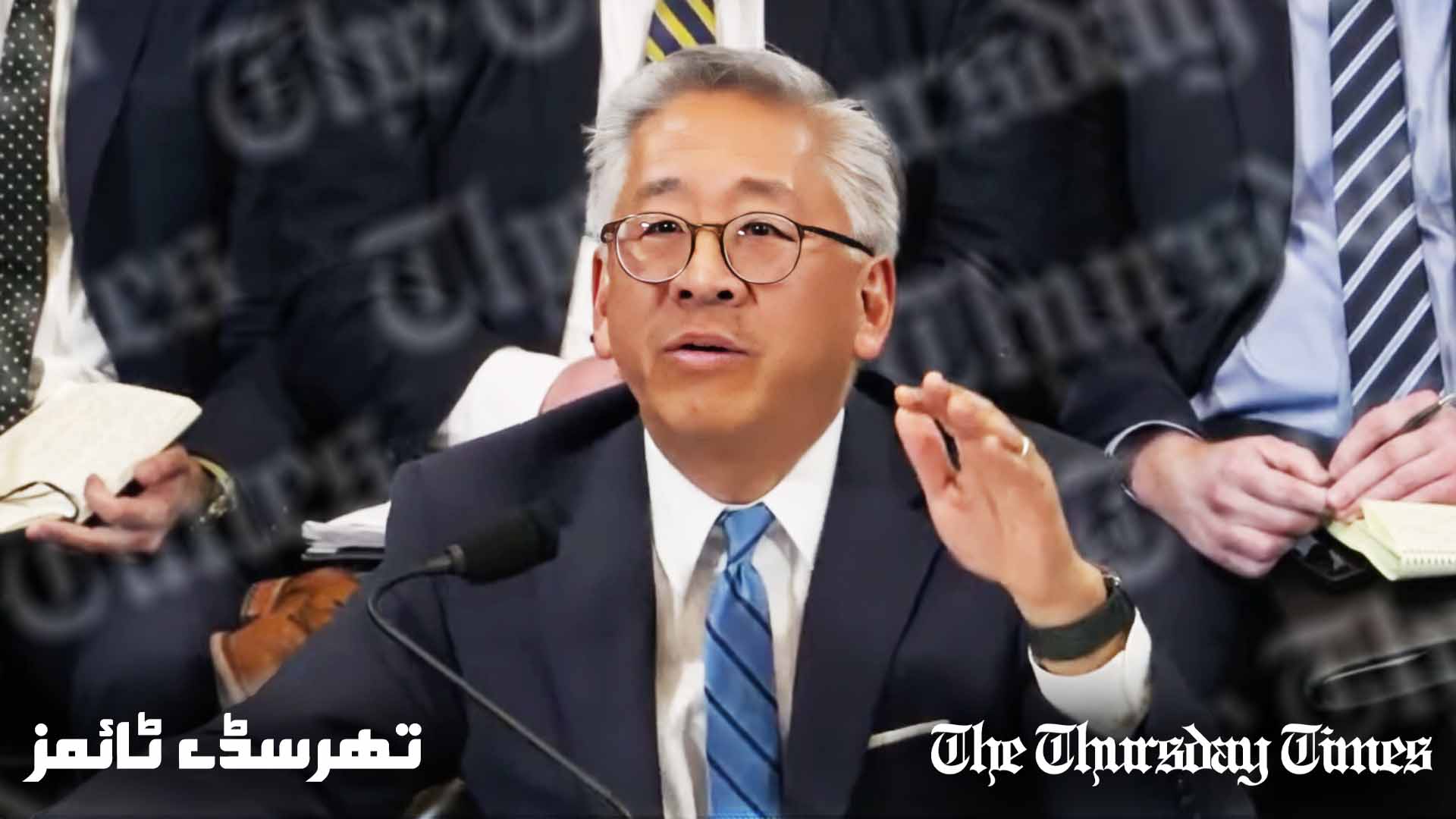WASHINGTON, D.C. (The Thursday Times) — US Assistant Secretary of State Donald Lu, during a hearing on Wednesday, addressed allegations made against him by former Prime Minister of Pakistan, Imran Khan, dismissing them as baseless conspiracy theories. These allegations were central to the ‘cablegate’ cipher controversy, where Khan accused the US of conspiring to remove his government in 2022, using a confidential document mishandled by Khan himself. This document was a diplomatic cable sent by the former Pakistan Ambassador to the US, Asad Majeed, to Islamabad, which Khan alleged contained warnings from Lu about a US conspiracy against his administration.
Speaking before a subcommittee of the US House Committee on Foreign Affairs, in a session titled ‘Pakistan After the Elections: Examining the Future of Democracy in Pakistan and the US-Pakistan Relationship’, Lu clarified that the allegations were completely false. He emphasised that the supposed diplomatic cable, often cited by Khan, neither accused the US government nor Lu personally of any conspiratorial actions against Khan. In his testimony, Lu emphatically refuted these claims, stating, “I want to be very clear on this point. These allegations — this conspiracy theory — is a lie. It is a complete falsehood.” He further clarified that the contentious diplomatic cable, known in Pakistan as ‘the cipher’, did not “accuse the US government or me personally of taking steps against Imran Khan.” Lu also mentioned that the then-ambassador of Pakistan to the US had testified to his government, affirming that there was no conspiracy.
During the hearing, disruptions occurred as an attendee called Lu a “liar” and chants of “Free Imran Khan” were heard. Despite these interruptions, Lu emphasised the US’s respect for Pakistan’s sovereignty and democratic process: “There is a line of acceptability and I think at times, some of the free speech has verged into threats of violence which is not acceptable in our society,” highlighting the personal impact of these allegations.
During the same hearing, Lu discussed the US State Department’s concerns regarding electoral abuses and violence leading up to Pakistan’s general elections. He highlighted the targeting of police, politicians, and gatherings by terrorist groups, the harassment of journalists, and the impediments faced by several political leaders in registering candidates and parties. Despite these issues, Lu noted the significant voter turnout, the increase in women elected to Parliament, and the participation of various minority groups. Addressing concerns related to the general elections in Pakistan, Lu provided a detailed overview, noting, “We were particularly concerned about electoral abuses and violence that happened in the weeks leading up to the polls.” He highlighted issues such as attacks on police and political gatherings, harassment of journalists, and challenges faced by political leaders in registering candidates. Despite these issues, Lu acknowledged the significant voter turnout and the diverse representation in the subsequent Parliament.
Addressing inquiries about the US’s stance on claims of election fraud, Lu explained that the Election Commission of Pakistan (ECP) is responsible for addressing such complaints. He emphasised the importance of a transparent process by the ECP, acknowledging the formation of a high-level committee to review thousands of petitions concerning electoral irregularities. Lu expressed confidence in the ECP’s ability to conduct repolling in instances of electoral abuse, underscoring the need for Pakistan’s institutions to function effectively and uphold the constitution. On the subject of election integrity, Lu emphasised the role of the Election Commission of Pakistan (ECP) in addressing complaints and ensuring a transparent process. “We as a partner of Pakistan have called for that to be done transparently and fully and for those found responsible for irregularities to be held accountable,” he stated, noting the establishment of a high-level committee by the ECP to review complaints.
During his testimony before a subcommittee of the US House Committee on Foreign Affairs, US Assistant Secretary of State Donald Lu discussed the recent elections in Pakistan, emphasising both their positive aspects and areas of concern. He highlighted the significant voter turnout despite threats of violence, noting, “Despite the threat of violence, over 60 million Pakistanis voted, including over 21m women. Voters elected 50 percent more women to Parliament than they had in 2018.”
Lu also pointed out the increased diversity among the candidates, stating, “In addition to record numbers of female candidates, there were also a record number of members of religious and minority groups and young people running for seats in their Parliament.” This diversity was reflected in the election results, which showed a broad range of political parties winning seats, leading to three different parties leading the four provinces of Pakistan. He added that, “honestly, on some days, I think Pakistani women are doing better than American women are.”
Addressing the integrity of the election process, Lu mentioned the presence of over 5,000 independent election observers in the field, whose organisations concluded that “the conduct of the elections was largely competitive and orderly while noting some irregularities in the compilation of results.”
When US Representative Dean Phillips asked for elaboration on the US State Department’s call for a thorough investigation into claims of election interference and fraud, Lu explained the constitutional responsibility of the Election Commission of Pakistan (ECP) in hearing complaints from candidates and political parties about poll irregularities. He stated, “We as a partner of Pakistan have called for that to be done transparently and fully and for those found responsible for irregularities to be held accountable. We can see a process whereby that is happening,” highlighting that the ECP had formed a high-level committee to sift through thousands of petitions that complained about the same issues noted by the US.
Lu assured that the US would be monitoring this process “very closely” and encouraged the Pakistani government and the ECP to ensure the process’s transparency to the public.
In response to a question from US Representative Rich McCormick regarding his trust in Pakistan’s judicial system to adjudicate claims of electoral wrongdoing, Lu initially addressed the protesters at the hearing who called for Imran Khan’s release. He then emphasised the ECP’s previous actions in conducting elections again in cases of electoral abuse and mentioned repolling in some constituencies for the current polls where there had been violence. Lu concluded, “We call on the ECP to fulfil its constitutional role in Pakistan to be the watchdog over these elections and to act in a nonpartisan way. We all will be watching this process very closely. As to whether they will do it, it is up to the Pakistani people to make sure their institutions are functional and upholding the Constitution.”
Lastly, Lu discussed Pakistan’s role as a crucial ally in the region, especially in the context of counterterrorism efforts and the resettlement of Afghan refugees. While acknowledging Pakistan’s importance, Lu also expressed concerns over Pakistan’s relationship with the Afghan Taliban, describing the current threat of terrorism from Afghanistan as significant. He concluded by highlighting ongoing dialogues aimed at influencing the Taliban’s behavior and ensuring they meet their commitments. He expressed concerns over Pakistan’s relationship with the Afghan Taliban, stating, “the current greatest terrorist threat to Pakistan emanated from Afghanistan.”
This is a developing story.




